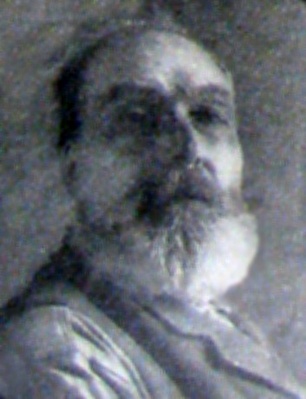 Oliver Lamora (Colliers, April 22, 1905, courtesy of the Adirondack Research Room, Saranac Lake Free Library)
Oliver Lamora (Colliers, April 22, 1905, courtesy of the Adirondack Research Room, Saranac Lake Free Library)
Born: 1864
Died: 1931
Married: Florence
Children:
Oliver Lamora was a Civil War veteran who owned a house in the midst of the twenty thousand-acre Bay Pond estate that William Rockefeller was assembling around the hamlet of Brandon. He became nationally famous for refusing to sell, and for his part in a lengthy legal battle that Rockefeller waged against him. Lamora initially prevailed in the courts, though in the end, he was found guilty of trespass and fined 18 cents, but he was also required to pay Rockefeller's court costs of $790. 1 The story has recently been told in Oliver's War: An Adirondack Rebel Battles the Rockefeller Fortune by Lawrence P. Gooley.
Burials in St. Paul's Cemetery, Fletcher Farm Road, Bloomingdale: LaMORA
Florence died Mar. 9, 1915 ae 43 yrs 10 mo
Wife of Oliver LaMORA
LaMORA
Oliver 1864 - 1931
Florence His Wife 1870 - 1950
(Fortune Funeral Home marker)
Adirondack News, December 27, 1902
Saunders & Saunders, attorneys of Dickinson Center, scored quite a victory at the last term of court at Malone in the case entitled Wm. Rockefeller vs. Oliver Lamora. The case was brought to recover damages for violation of the park law of 1896, by trespassing upon his private park and taking fish from the middle branch of the St. Regis river, which flows across his land. The case was first tried before a justice of the peace and a verdict found for the defendant, the plaintiff appealed to the county court for a new trial and resulted in a non-suit in favor of defendant Lamora. It appears that a portion of the waters had been stocked with fish by the state at public expense. Kellas & Genaway were the attorneys for the plaintiff.
Adirondack News, July 20, 1907
POSTOFFICE AT BRANDON.
A Washington dispatch of July 15th says: Postmaster-General Meyer has settled the controversy over the removal of the postoffice at Brandon, N. Y., to Bay Pond, N. Y., by re establishing the office at Brandon and appointing Ludger Grenier as postmaster.
It was shown by papers on file in the postoffice department that Wm. Rockefeller brought about the removal of the office from Brandon to Bay Pond by purchasing nearly all the real estate in the village to add to his estate of 52,000 acres. The office then was removed to Bay Pond, three miles within the confines of Rockefeller's estate.
It was shown, too, that Oliver Lamora, a civil war veteran, who had incurred Rockefeller's displeasure, was afraid to go through the Rockefeller estate to Bay Pond to get his mail lest he be arrested for trespassing.
When the facts were brought to Postmaster-General Meyer's attention he ordered an investigation and the report of the inspectors reached him recently.
The Bay Pond office will be continued, as it supplies a large number of people with mail.—Palladium.
Seaver, Frederick J., Historical Sketches of Franklin County, Albany, NY: J. B. Lyon Co., 1918, p. 538
Fifteen to eighteen years ago a contention that arose between Mr. Rockefeller and Oliver Lamora attracted not merely local, but almost country-wide interest. Because Mr. Rockefeller was a millionaire and Mr. Lamora poor, there was a widespread disposition to regard the case as one of oppression and persecution. Naturally, Mr. Rockefeller, having the purpose of game protection and of preservation of the forest from fires, did not want settlers on lands that were bounded on all sides by his private park, nor trespassing hunters and anglers within the park itself. Thus he proceeded to buy the holdings of every one who could be induced to sell, offering fair prices as measured either by cost to the settlers or by any other test of value to them. To Mr. Lamora he offered twelve hundred dollars for property that had probably cost not to exceed five hundred dollars. Mr. Lamora not only refused to sell, but persisted in trespassing upon Mr. Rockefeller's lands and poaching in his preserve. Suits were instituted and prosecuted, and an intensely bitter feeling developed on the part of Mr. Lamora, and also upon the part of most men in this section who had grown up in the understanding that the forests were free to whomsoever might desire to hunt or camp in them, and the streams open also for fishing. But I could never comprehend that Mr. Rockefeller's intention and efforts to enforce his indisputable legal rights in his own property merited censure; and it seems impossible that a dispassionate consideration of the case could pronounce him at fault. After Oliver Lamora's death his son sold to Mr. Rockefeller for a thousand dollars the property for which the father had refused twelve hundred dollars.
Comments
2011-01-07 08:06:06 spelling error: changed "mall" to "mail". —74.78.176.212



